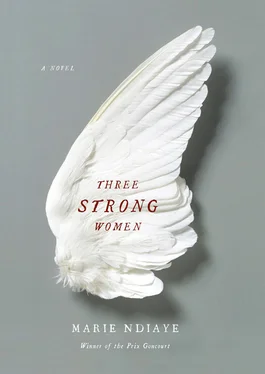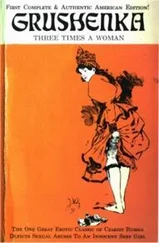Dogs were howling in the distance.
Apart from the rustling of people’s clothes and the noise of their flip-flops scraping the sand, that was the only sound to be heard in the darkness.
The last houses disappeared.
She then felt her thin plastic soles sinking into deep sand, still warm on the surface but cold underneath. The march of one and all around her was slowed, impeded by the mass of fine sand that filled their slippers and flip-flops and suddenly froze their toes and ankles, whereas their foreheads were still pouring with sweat.
She was aware, too, almost in advance, almost before it happened, of an end to the prudent hushed consensus that had prevailed in the street, and she guessed, from an imperceptible quiver, from a more pronounced sound of breathing running through the moving, undulating crowd, that the danger, whatever it was, of being heard and noticed had passed, or else perhaps the tension had reached such a point now as they were approaching the sea that the need for restraint could be set aside and forgotten.
Shouts broke out. All Khady could distinguish was a change of tone, to one of considerable anguish.
One child started to cry, then another.
The men in front leading the group halted and shouted orders in a feverish, menacing tone.
They’d switched on flashlights, which they shone in people’s faces as if they were looking for someone in particular.
Then, in the sudden flashes of harsh white light, Khady was able to see, in fleeting fragments, the dazzled, half-closed eyes and faces of those who up till then had seemed to form an undifferentiated mass.
They were all more or less young, like her.
One man with a calm, rather sad air made her think momentarily of her husband.
The beam of light flashed across her own face and she thought, Yes, me, Khady Demba, still happy to utter her name silently and to sense its apt harmony with the precise, satisfying image she had of her own features and of the Khady heart that dwelled within her to which no one but she had access.
But she was afraid now.
She could hear the waves crashing close by, and out at sea she could see other lights, less harsh, yellower, bobbing up and down.
Yes, she was very afraid.
With a fierce effort that made her dizzy she tried frantically to connect what she was seeing and hearing — flickering lights, the roar of the surf, men and women assembled on the beach — to something she’d heard in her husband’s family, at the market, in the yard of the house she’d been living in, and even before that, in the little café she ran where she thought of nothing all day but of the child she so longed to conceive.
It seemed she ought to have been able to remember snatches of conversation or the odd word heard on the radio, things caught on the wing and stored vaguely in her mind along with other information of no interest at the time but not without the potential one day to acquire it — it seemed to her that, without having paid attention to the subject at one stage in her life, or thinking it important, she’d nevertheless known what such a combination of elements (night, flickering lamps, cold sand, anxious faces) signified, and it seemed to her that she still knew, but for her stubborn sluggish mind blocking access to a region of sparse, jumbled knowledge to which possibly, certainly, the scene before her was in some way connected.
Oh, she was very afraid.
She felt as if she’d been prodded in the back and was being pushed forward by the abrupt surge of the group toward the sound of crashing waves.
The men with flashlights were getting increasingly nervous and were shouting more and more insistently as people got nearer the sea.
Khady felt her flip-flops getting submerged in the water.
She now clearly saw lights moving in front of her and realized that they must be coming from lamps hung on the bow of a boat. Then, as if she’d had to work out what it was all about before being able to see it, she made out the shape of a large craft not unlike those whose landing she waited for when, as a little girl, she’d been sent by her grandmother to buy fish on the beach.
The people in front of her went into the water, holding their bundles above their heads, then climbed into the boat, helped up by those already on board, whom Khady could make out in the yellowish, fragile, swaying lights, their faces calm and preoccupied, before she too moved forward awkwardly in the cold sea, throwing her bundle in before letting herself be pulled up into the boat.
The bottom was filled with water.
Gripping her bundle, she crouched on one of the sides.
An indeterminate, putrid smell rose from the wood.
There she remained, stunned and dazed. Such a large number of people were still climbing into the boat that she was afraid of being squashed or suffocated.
She staggered to her feet.
Seized with terror, she was panting.
She pulled up her wet batik, put a leg over the edge of the boat, grabbed her bundle, and lifted the other leg.
She felt a terrible pain in her right calf.
She jumped into the water.
She waded back to the beach and began running along the sand. It got increasingly darker as she left the boat behind.
Although her calf hurt a great deal and her heart was beating so fast that she felt sick, she was filled with delirious, fervent, savage joy at realizing, clearly and indubitably, that she’d just done something that she had resolved to do, once she’d decided — very quickly — how vitally important it was for her to leave the boat.
She realized too that such a thing had never happened before: making a decision, quite independently, about something that mattered to her . Her marriage, for instance: because it represented a way to cut loose from her grandmother, she’d been only too eager to accept when this quiet, gentle man — a neighbor at the time — had asked her for her hand. It certainly wasn’t — she thought as she ran, gasping for breath — because she thought that her life was her own and that it involved choices that she, Khady Demba, was free to make, oh, certainly not. It was she who’d been chosen: by a man who’d turned out fortunately to be a good husband. But she hadn’t known it then: at the time she’d just felt grateful, relieved, to have been chosen.
Exhausted, she collapsed in the sand.
She was barefoot: her flip-flops had remained in the water or perhaps at the bottom of the boat.
She touched her injured calf and felt blood running from her torn flesh.
She told herself she must have caught her leg on a nail as she leaped out of the boat.
It was so dark she couldn’t see the blood on her hand even when holding it close to her eyes.
She rubbed sand on her fingers for a long while.
What she could see — far away, much farther than she thought she could have run — were small yellowish lights, motionless in the distance, and the powerful white beam of a torch, probing the darkness continually, jerkily, enigmatically.
At dawn she realized, before she’d even opened her eyes, that what had aroused her was not anxiety, nor the sharp pain in her calf, nor the still feeble brightness of the day, but the imperceptible sensation of tingling on her skin, of someone’s motionless, insistent stare. In order to give herself time to regain her composure she pretended to be still asleep, while quite alert.
She suddenly opened her eyes and sat up on the sand.
A few yards away a young man was kneeling. He didn’t lower his eyes when she looked at him. He just cocked his head slightly and held his hands up with their palms toward her to indicate that she had nothing to fear. She scrutinized him furtively and cautiously. Flipping through her mental images of the previous evening with a speed and lucidity she no longer thought herself capable of, she recognized one of the faces she’d glimpsed, pale in the beam of the torch, just before climbing into the boat.
Читать дальше












